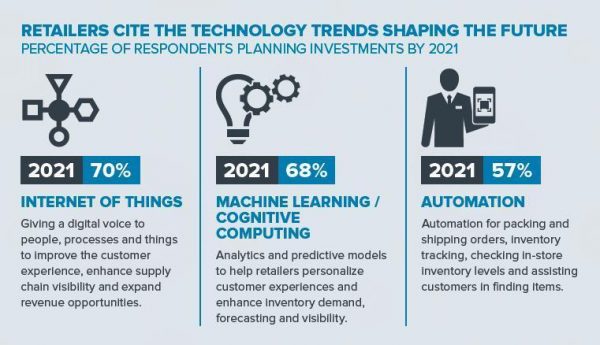According to a recent survey conducted by Forrester’s Research, a majority of large corporate establishments are planning to use IoT technologies.
IoT technology is revolutionizing the retail industry and is facilitating a plethora of opportunities in customer service. In this context, it is important to mention that the technologically advanced retailers are installing smart shelves which can forecast when the inventory is low and are gaining competitive advantage.
Nowadays, with the advent of the internet and modern gadgets, retailers are keener to push for a personalized shopping experience by using IoT. With the help of IoT technology, customer related data like frequency of their visit and buying behavior can also be tracked in an effective manner. It is a commonly observed fact that nowadays one can find an array of sensors to monitor the activities of the shoppers.
These sensors also keep the customer attendants on their toes to assist the shoppers in case they need any form of help.
IoT is all set to modernize retail to new zeniths of success
A recent survey has depicted that 70% of the retail decision makers worldwide are ready to adopt IoT. On the other hand, with the demand for an Omni channel experience at an all-time high, the retailers are of the opinion that it is crucial to integrate in-store experiences and e-commerce.
On the other hand, another survey indicates that by the end of 2021, the retailers are planning to invest 70% of their total revenue in an Internet of Things. They are mainly utilizing IoT to facilitate real-time shopping experience to the customers. It is also interesting to note at the same time that automation can also render various advantages in the retail including tracking of inventory and enabling higher levels of service to the customers.

IoT would make inventory management easier
In order to ensure that items in demand are never out of stock, the retailers are now taking help of the IoT technologies.
In this context, it is important to note that retailers are using a host of modern-day tools and analytic sensors to facilitate real-time tracking of shipping orders and inventory. With the help of this real-time inventory tracking, the retailers can determine which item is in high demand and what is left in the store.
On the other side, with the help of this real-time tracking, they can now reload the exhausting stock at the right time so that they can cater to the needs of their respective customers. Furthermore, with the inclusion of automation in the inventory management, retailers are finding it more comfortable to satiate the needs of their customers.
As per ZRV study, more than 70% of the retailers would probably invest in IoT technology. Interestingly, this technology would also assist the online marketers to reduce cost and increase revenue. Additionally, it can be said that IoT would help to create a differentiated brand experience.
The ways in which IoT is influencing the retail sector
IoT has made a significant impact on the retail industry and can be regarded as a force to reckon with nowadays. On the other hand, with the evolution of the internet, one can easily observe the indelible mark that it has cast on the e-commerce and retail domain.
In this context, it is important to note that with the help of IoT, the retailers can easily digitize everything which ranges from pre-sale to customer targeting. The driving innovation of IoT would always aim to connect customers and retailers in a digital world.

IoT would facilitate unified customer and retail experience
It is a widely accepted fact these days that retailers and customers are enjoying a slew of benefits with the proliferation of various devices coupled with IoT.
For instance, the customers can scan the product’s barcode with the assistance of their mobile device. In this manner, they can garner information related to the product by searching for it on the internet.
On the contrary, in case of apparel store retailing, the store owners can always install smart mirrors which can help them to see how appropriate apparel would fit them without wearing it. With the help of automatic scanning, the retailers can facilitate contactless scanning of the goods.
IoT has also promoted the consumers to create shopping lists that are digital. For instance, in majority of earring stores, they can create smart shopping carts. These intelligent shopping carts would make the payment process at the time of the checkout.
IoT would help identify shrinkage and fraud
A decline of sales in the retail sector is caused when there is a prevalence of corruption or shoplifting by the customers and the employees. In the year 2014, the retailers have almost lost close to 50 billion dollars due to the reason of retail shrinkage.
However, nowadays, the products are equipped with RFID tags to prevent shoplifting and other malicious activities in the store. RFID refers to radio frequency identification, and if anything is stolen, these tags will assist in identifying the product when sold in the gray market. These tags would also help the retailer to track the outcome and earn more information about it. It is also interesting to note that a large number of departmental stores are increasingly using these RFID tags to avoid shoplifting activities.
Capturing data is a huge challenge for retailers nowadays. But with IoT, data analysis has become a lot simpler. With the help of end-to-end IoT tactics, a retailer can easily attract and retain a customer.






Leave a Reply